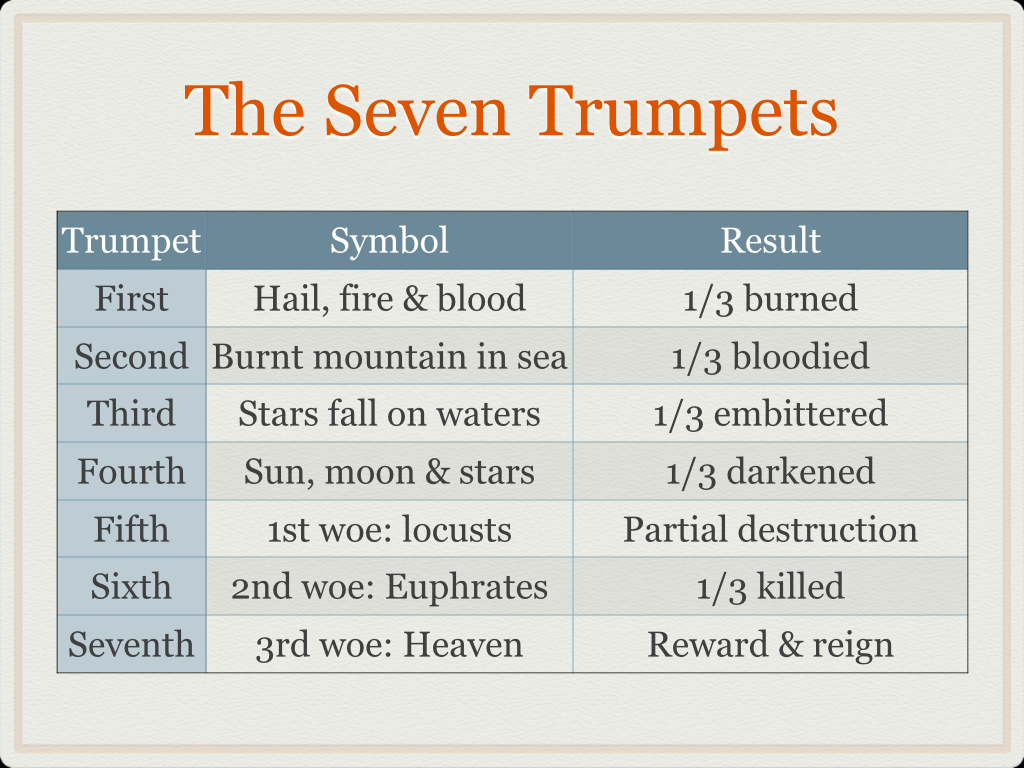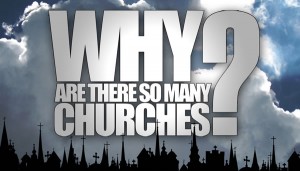
The third of six murals in the 1960s St Benet’s Chaplaincy, Queen Mary’s, University of London. Painted by Adam Kossowski. Courtesy of the Art + Christianity Enquiry (ACE) Trust.
The Book of Revelation could very well have ended with the seventh seal. The angel of the Lord (Rev 1:1) could have completed his vision to John after God handed down his verdict to his Son (4:1-8:5). John would have recorded the message faithfully, immediately sent his work to the Asian churches on the mainland, and died in exile awaiting the judgment Jesus had revealed. But the Lamb of God was far from finished and John, too, had much work to be done.
The seventh seal was simply no place to end. If you recall, the opening of the seal begins with “silence in heaven for about half an hour,” but ends with fire being thrown to the earth, accompanied by “peals of thunder, rumblings, flashes of lightning, and an earthquake” (8:1, 5 ESV). And as the first four angels blow their trumpets we see how God answers the prayers of his people (8:3-5): hail and fire, mixed with blood (8:7); a mountain of fire that turns the sea to blood (8:8-9); a falling star that poisons their drinking water (8:10-11); and a blackness that blots out the lights of heaven (8:12).
Of course, we have seen these symbols before, just two chapters earlier, as the outcome of the first six seals (Rev 6). But the angel does not merely repeat himself, he proclaims more completely aspects of God’s judgment that had before only been hinted at. As Victorinus wrote, “And although there is a repetition of scenes . . . this is not as though the events occurred twice. . . . For the sevenfold Holy Spirit [1:4], when he has passed in revue [God’s acts of judgment] . . . returns again to the same times and supplements what he had said incompletely” (Commentary on the Apocalypse 8.1-2, ACCS).
The trumpets are not, then, a second judgment, but a second look at the same judgment against the enemies of God and his people. And as John soon sees, it will be even worse than he thought. With the seals, we saw a fourth of the earth killed by sword, pestilence, and wild beasts (6:8), but now the breadth and magnitude of the judgment has grown: a third of the earth and its vegetation, with all green grass is burned (8:7); a third of the sea creatures and ships are destroyed (8:9); a third of the waters are poisoned, killing many (8:11); and a third of the sun, moon and stars are darkened (8:12). God is symbolically preparing for Rome the same plagues he brought against his old enemy Egypt (Exo 7:20-21; 9:24-25; 10:21-23). For those in the first-century, though, there was an even more vivid memory:
A few years before this writing Mount Vesuvius had erupted (August, A.D. 79) pouring forth a fiery flood which engulfed Herculaneum and Pompeii . . . . Ashes from the burning mountain fell on ships far out in the sea and upon the distant shores of Egypt and Syria. Pliny relates that there was first an earthquake followed by the eruption which sent an avalanche of fire down the mountainside into the sea. Many who eluded the streams of lava were suffocated by the sulphurous [sic] fumes which reached far away. The sky was darkened so that Pliny said, “It was now day elsewhere, but there night blacker and thicker than all night.” (Summers 156)
But just because they had seen this before, didn’t mean the vision was any less terrifying. In fact, the worst was yet to come: “Woe, woe, woe to those who dwell on the earth, at the blasts of the other trumpets that the three angels are about to blow” (Rev 8:13)! Satan is given keys to the abyss—the hellhole (in Greek Tartarus, 2Pe 2:4) prepared for him and his angels (Mat 25:41; Jude 6-7)—and a demonic swarm arises from the raging inferno: Satan’s army is on the move (Exo 10:12-15; Joel 1:4; 2:1-11; Gen 19:23, 27-28).
Behind the veil of Roman power is the oldest Enemy of mankind, but his influence is restrained by the providential hand of God. Satan has limited authority (he was given the key, Rev 9:1), limited power (only those not sealed by God, a third of mankind, 9:4, 15), a limited time (five months, 9:6), and limited resources (200 million, 9:16, vs. the multitude without number, 7:9). Even more remarkable is the target of his assault: the very city that worshipped him. Rome’s sins had reached new heights, and as before God would plunge his opponents into a destruction of their own making.
But they refused to see their fall for what it was, a punishment of sin and a warning of even greater punishment to come, so they refused to change their ways: “The rest of mankind, who were not killed by these plagues, did not repent of the works of the hands nor give up worshipping demons and idols of gold and silver and bronze and stone and wood, which cannot see or hear or walk, nor did they repent of their murders or their sorceries or their sexual immorality or their thefts” (9:20-21; see Dan 5:22-23; Luke 10:19-20; Dan 12:3, 8-10). They had united the lies of demonic sorcery to the degradation of materialist luxury and the political absolutism of a worldwide empire (Rev 9:19). But God would now remind them to whom all worship should be directed, who owns all things, and who holds all power.
And through it all, the church of the Lord would persist in the mission she had been called to perform: to proclaim the message of salvation and judgment. An angel comes to John, speaking with the authority of Christ himself (10:1-3; 1:12-16), indicating that even these trumpets do not tell the full story—God’s judgment is still partially obscured (10:4-7). So John himself would be given the rest of the story, and then be empowered to preach to “many peoples and nations and languages and kings” (10:11). But the message was bittersweet, to some a promise of salvation and to others the warning of judgment (10:8-10). As Paul would say, “For we are the aroma of Christ to God among those who are being saved and among those who are perishing, to one a fragrance from death to death, to the other a fragrance from life to life” (2Co 2:15-16).
But once again, the church would not be alone. As they proclaimed the gospel of Christ, his Spirit would dwell among them as his temple and empower their witness (11:1; Eph 2:19-22; Mat 28:18-20). The church today lives “in the court outside the temple,” moving freely from our common space-time to the sacred transcendence of spiritual worship, where Christ himself has entered by his own blood, tearing down the veil that separated us from God (Rev 11:19; Heb 8:1-2; 9:12; 10:19-25). We are the very furniture of heaven, adorning God’s temple as carved olive trees and golden lampstands, kings and priests who minister before our God both now and in eternity (Rev 11:4; 1:6, 20; Zec 3:1; 4:9-14).
And while persecution will still come to the holy city, the time is limited; we will be trampled for forty-two months, but we will reign for one thousand years (Gal 4:25-26; Rev 11:2-3; 20:4-6). As Oden reminds us: “Believers are already presently sharing in the coming reign of God. Nonetheless, amid continuing history there still remains this period ‘between the times’ in which the reign of God has been inaugurated yet not consummated as expected in the last days” (3.9.1, internal citations omitted; Rom 6; 1Ti 6:12; 1Jo 5). And yet the power we have, is the power of the kingdom, and the King himself. We have power in preaching (Rev 11:5; Acts 4:33; Rom 1:16-17), power in prayer (Rev 11:6; 8:3-13; Jam 5:15-18), and power in persecution, so that even when our dead bodies lie discarded in the streets, we know that we have conquered (Rev 11:7-13).
Then at the seventh and last trumpet, our bodies will welcome the return of our spirits; we will stand and strike fear into the hearts of our enemies; we will rise as pure and glorious as the One who raised us (1Co 15:51-57; Eze 37:4-10; Rev 7:2-3; 1Jo 3:2-3). And we will fall on our faces in the consummated kingdom of God, singing, “We give thanks to you, Lord God Almighty, who is and who was, for you have taken your great power and begun to reign. The nations raged, but your wrath came . . . rewarding your servants . . . and . . . destroying the destroyers of the earth” (Rev 11:17-18).
The Lamb had revealed God’s judgment, the angels proclaimed it, and Rome would now feel the fury of his wrath. Satan’s strength was limited and waning, but God’s people possessed a power that would sustain them through it all: the power of God himself. “Little children, you are from God and have overcome them, for he who is in you is greater than he who is in the world. . . . For everyone who has been born of God overcomes the world. And this is the victory that has overcome the world—our faith” (1Jo 4:4; 5:4).
The following files are now available for free viewing and download:
Attachments
- 04 Slides: The Seven Trumpets (Rev 8:6-11:19)
Audio Recordings
- Week 19: The Seven Seals & Trumpets (7:15-8:13) **Session was not recorded**
- Week 20: The Seven Trumpets, Part One (9:1-12) **Session was not recorded**
- Week 21: The Seven Trumpets, Part Two (9:13-21) **Session was not recorded**
- Week 22: The Seven Trumpets, Part Three (10:1-11:3)
- Week 23: The Seven Trumpets, Part Four (11:4-18)
Works Cited
- Ancient Christian Commentary on Scripture. Ed. Thomas C. Oden. InterVarsity, 2003. Accordance.
- The ESV Study Bible. Ed. Lane T. Dennis & Wayne Grudem. Crossway, 2008. Accordance.
- Oden, Thomas C. Classic Christianity. HarperCollins, 2009. iBooks.
- Summers, Ray. Worthy is the Lamb: An Interpretation of Revelation. Nashville: Broadman, 1951. Print.
Cross-posted from In His Image.





